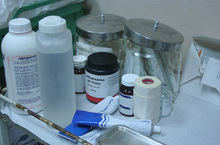A horse from southern Patrick County has tested positive for rabies according to a Virginia Department of Health news release. Additional details about the horse and its condition are not yet available.
Rabies continues to be present throughout Virginia. In Patrick County, five animals tested positive for rabies in 2011 including two skunks, one each fox, raccoon and cat. Six animals tested positive for rabies in 2010 including three foxes, one each raccoon, bat and skunk. Since 2006, the number of confirmed animal rabies cases has ranged from 564 to 730 each year, statewide.

Rabies, a threat to horses
Quick action before symptoms develop may save horse infected with rabies virus
“This is a reminder that rabies is a real threat in our area,” said Gordon Green, MD, director of the West Piedmont Health District. “Although raccoons, skunks and foxes are the animals that most frequently contract rabies, any mammal, including livestock, can be infected by the virus."
Virginia law requires rabies vaccinations and boosters for dogs and cats 4 months old and older. Vaccines also are available for ferrets and livestock, so owners should check with their veterinarian for the most appropriate vaccine and vaccination schedule to protect their animals.”
Rabies is almost always fatal, the release stated. The rabies virus is present predominantly in the saliva and nervous tissue (brain and nerve cells) of infected animals and is transmitted most often by a bite. It also can be transmitted when saliva or nervous tissue gets into open cuts or mucus membranes, such as the eyes, nose and mouth. Rabies causes an inflammation of the brain and is almost always fatal once symptoms develop.
When a person or animal is exposed, timely treatment is effective in preventing the development of rabies. Contact your doctor or veterinarian immediately to discuss treatment, if you suspect you or one of your animals might be infected. For animals, depending on their vaccination status and likelihood of exposure, strict isolation for up to six months may be required.
The best ways to prevent the spread of rabies are:
- Vaccinate all dogs, cats and ferrets by 4 months of age, by a licensed veterinarian, and keep vaccinations current;
- Enjoy wildlife at a distance;
- Secure your yard and home and eliminate possible sources of food, water and garbage that can attract wildlife and other animals;
- Do not allow your animals to roam free;
- Avoid contact with stray animals;
- If you are bitten or exposed to rabies, wash the wound thoroughly with lots of warm water and soap and seek medical attention immediately; and
- Vaccinate horses and other livestock, as recommended by your veterinarian.
